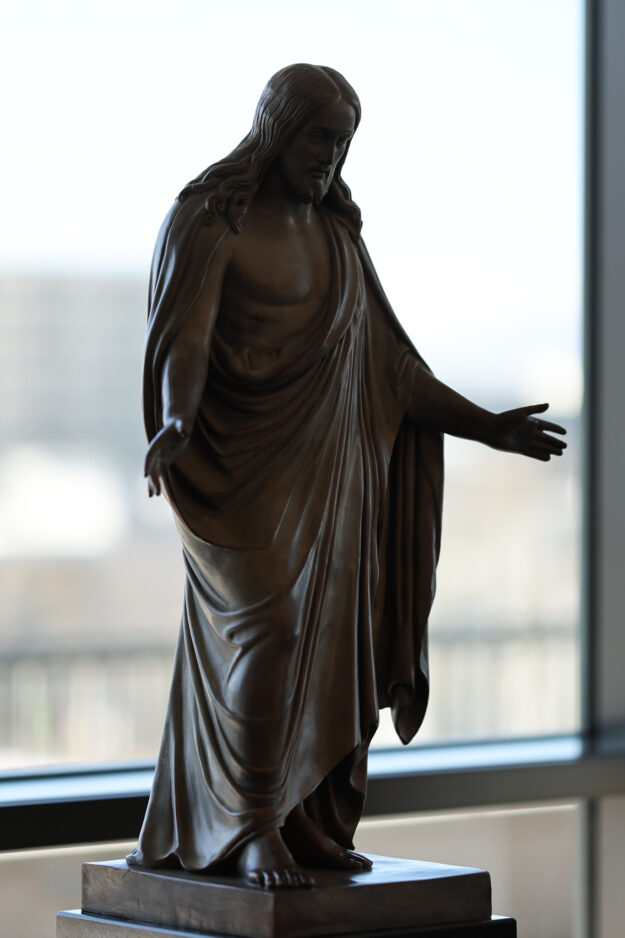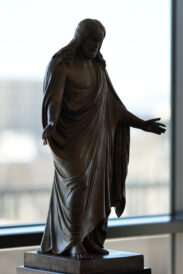Conference Counsel: Discipleship of Jesus Christ is evidenced by charity
- A Christus statue in the Conference Center on Temple Square in Salt Lake City, Utah, during general conference weekend on Saturday, April 5, 2025, and Sunday, April 6, 2025.
- Ryan Comer

Photo supplied, Intellectual Reserve
A Christus statue in the Conference Center on Temple Square in Salt Lake City, Utah, during general conference weekend on Saturday, April 5, 2025, and Sunday, April 6, 2025.
A Thursday letter that was signed by President Russell M. Nelson, president of The Church of Jesus Christ of Latter-day Saints, as well as his two counselors in the First Presidency – President Dallin H. Oaks and President Henry B. Eyring – stated that general conference, which will be next month, “provides an opportunity to receive personal revelation as general Church leaders give counsel and direction from the Lord.”
I think a really good example of how that happens is evidenced by the talk I will be looking at this week.
In the April general conference, Elder Michael B. Strong of the Seventy gave a talk titled “Charity–a Sign of True Discipleship.” The talk was based on a comment President Nelson made at the October 2024 general conference, when he invited all to make discipleship their highest priority.
“That powerful invitation has stirred me to ponder deeply about my personal discipleship of Jesus Christ,” Elder Strong said.
Elder Strong proceeded to explain how we can be better disciples of Jesus Christ, specifically through charity. As I listened to his counsel, it struck me just how much personal revelation can come from even just one sentence from the prophet.
What is discipleship?

Ryan Comer, Standard-Examiner
Ryan Comer
Expounding on discipleship before he got into the core of his remarks, Elder Strong highlighted that “discipleship is deliberate.”
He defined a disciple as “a follower or student of another” and said disciples “devote their lives to becoming like their teacher.”
By those definitions, Elder Strong said, “being a disciple of Jesus Christ implies more than believing His teachings and doctrine. It even implies more than acknowledging His divinity and accepting Him as our Savior and Redeemer, as vitally important as that is.”
He added:
“To be the Lord’s disciples, we must intentionally imitate His thoughts and actions every day–for example, His obedience, humility, and patience. As we gradually incorporate these attributes into our own identities, we become ‘partakers of [His] divine nature.’ This emulation of the Savior’s character is at the heart of worshipping Him. As President Nelson taught, ‘Our adoration of Jesus is best expressed by our emulation of Jesus.'”
That may sound like an impossible challenge to imitate the Savior’s thoughts and actions every day when he is the only person who has ever and will ever live who never sinned, but Elder Strong gave us one attribute to focus on.
The preeminence of charity
“That attribute is His pure love, or charity,” Elder Strong said. “Both the prophet Mormon and the Apostle Paul remind us that without charity, ‘[we] are nothing.’ Or, as revealed to the Prophet Joseph Smith, without ‘charity, [we] can do nothing.’
“The Savior Himself identified love as a mark or sign by which His true disciples would be recognized when He declared:
“‘A new commandment I give unto you, That ye love one another; as I have loved you, that ye also love one another.
“‘By this shall all men know that ye are my disciples, if ye have love one to another.'”
In what ways can we show that kind of charity? Elder Strong presented three “patterns of (Christ’s) charity that are readily seen in His true disciples.”
Charity through compassion
First, Elder Strong spoke of compassion. He highlighted the Savior’s compassion during his visit to the Nephites, which we read in the Book of Mormon, when he healed those who were sick and afflicted and blessed the children while angels from heaven surrounded them.
Compassion happens when we truly care about someone else’s thoughts and feelings. For Elder Strong, he saw this attribute manifested during a tragic personal trial on his mission to South America.
“One evening while I was driving with my companion to the home of our mission president, a young man on a bicycle turned suddenly in front of the vehicle,” Elder Strong recalled. “It happened so quickly that I could not avoid the collision. Tragically, this young man was killed by the impact. I was devastated over the loss of his life. Terrified and in shock as the awful reality of what had just occurred crashed down upon me, I was taken to jail and locked up. I have never felt more frightened and alone. I was filled with despair and fear that I would be imprisoned for the rest of my life.
“A fellow missionary, Elder Brian Kochevar, learned of the accident and was moved by compassion. He came to the jail and pled with the officers to be allowed to stay with me in the cell so that I would not be alone. Miraculously, they agreed. To this day, I feel profound gratitude for this disciple’s act of Christlike love, which calmed, comforted, and consoled me during the greatest moment of distress in my life. His charitable compassion was a telling sign of his discipleship. As President Nelson observed, ‘One of the easiest ways to identify a true follower of Jesus Christ is how compassionately that person treats other people.'”
There are no shortage of opportunities to show compassion toward those around us. If we’re in tune with the spirit, we will see them all the time, and then it becomes our responsibility to act on them. True disciples of Jesus Christ heed those promptings.
I have noticed throughout my life that a feeling of approval from the spirit always follows heeding promptings. It’s like some unseen person is near me confirming to me that I just did what I was supposed to do.
Charity through ‘ministering to unspoken needs’
Secondly, Elder Strong spoke of ministering to the unspoken needs of others.
This can be challenging because if someone has needs but they don’t share them, how can we know? But that’s what Jesus did.
“To the man who had been lame for 38 years with no one to help him, the Lord made him whole and encouraged him to live righteously,” Elder Strong said. “To the woman caught in adultery, He offered hope and comfort rather than condemnation. For the man with paralysis who was lowered from the roof, the Lord offered forgiveness of sins, not just healing of body.”
Tying the thought to his personal life, Elder strong continued:
“When I was called to serve as a bishop, our six young children made sacrament meetings challenging for my wife, Cristin, who had to manage them alone while I sat on the stand. As you may imagine, our children were often less than reverent. Noticing her situation, two members of our ward, John and Debbie Benich, began sitting with her each Sunday to help. Their kindness continued for years, and they became surrogate grandparents to our family. Like the Lord, these disciples had noticed the unspoken need and acted in love–a prominent sign of their discipleship.”
A lot of people won’t broadcast their problems. They won’t share everything that is wrong in their lives. But that’s not an excuse for us to not minister to them. If we have a charitable heart and are looking for ways to be Christ’s disciple, we will notice the needs that aren’t spoken.
I remember a similar instance that Elder Strong recalled. A number of years ago, I was sitting in sacrament meeting with my two boys, who I don’t think were even five at the time. A priest who had been blessing the sacrament noticed them providing some challenges, and so after the sacrament had been administered, he came down off the stand and offered to sit next to me to help keep them entertained. It’s a memory that I will never forget because it was a perfect example of someone who witnessed an unspoken need, surely had a prompting and acted on it.
Charity through ‘helping others along the covenant path’
Third, Elder Strong spoke of helping others on the covenant path back to Heavenly Father and Jesus Christ.
As children of the same Heavenly Father, our example should be one that helps people get onto and remain on the path that leads back to him and Jesus Christ.
“As we become more like our Master, our desire to help our brothers and sisters along the covenant path will naturally increase,” Elder Strong said.
“For instance, we can uplift and befriend those who feel offended or forgotten, help those who are new to our congregation feel welcome, or invite friends to worship with us at sacrament meeting… There are countless ways to encourage and assist others in their progression if we deliberately and prayerfully seek heaven’s help to have eyes to see and a heart to feel how Jesus Christ sees and feels for them.”
To emphasize his point, Elder Strong highlighted an experience from his current assignment in the Philippines that involved the Agamata family.
“They were baptized in 2023, and then they eagerly set a date to be sealed as a family in the nearby Urdaneta Philippines Temple,” Elder Strong said. “However, just before the family’s appointment, several typhoons struck the region. Brother Agamata, a rice farmer, was unable to plant his crops during the harsh storms. When the tempests finally passed, he needed to quickly plant the rice while the ground was soaked with water–ideal conditions for planting. Sadly, the temple trip would have to be postponed.
“Two disciples, Elder and Sister Cauilan, along with three young service missionaries, heard of the Agamata family’s struggle and offered help despite having no farming experience. Working under the blistering sun, they helped plant the seedlings, allowing the Agamatas to complete their task and attend their temple sealing as scheduled. Elder Cauilan observed that ‘[the Agamatas’] countenances glowed as we saw them dressed in white in the house of the Lord. The joy we felt ministering to the one is a joy beyond compare!’
“The Agamatas now enjoy the rich blessings of being sealed as an eternal family because a few fellow disciples who were filled with charity–a sign of their discipleship–determined to help their brothers and sisters forward along their covenant path.”
When I hear that story, it makes me think about the many opportunities I have to help people along the covenant path that aren’t even close to as laborious.
A personal challenge that came into my mind is to try and think of one thing each day that I can do to demonstrate charity in the three ways Elder Strong highlighted: shows compassion for someone else, ministers to someone’s unspoken needs and helps someone along the covenant path. That might sound hard, but I bet that it would be a lot easier than it may sound if it was truly my goal.
How’s that for personal revelation while studying a general conference talk?
Conclusion
Concluding his remarks, Elder Strong said:
“Brothers and sisters, discipleship of Jesus Christ is the only way to obtain enduring happiness. It is a path filled with deliberate and purposeful acts of love toward others. While the path of discipleship may be difficult and challenging, and while at times we may struggle and fall short, we can take comfort that God is mindful of us and yearns to help us every time we try. Isaiah reminds us that ‘God will hold [our] hand, saying … , Fear not; I will help thee.’
“With this assurance from our Father in Heaven in mind, I earnestly pray that we may follow President Nelson’s invitation to prioritize our discipleship. May we ‘pray unto the Father with all the energy of heart’ to ‘be filled with this love, which he hath bestowed upon all who are true followers of his Son, Jesus Christ; … that when he shall appear we shall be like him’ because we will carry a sign of true discipleship, which is ‘charity … the pure love of Christ.'”
Contact Ryan Comer at rcomer@standard.net.




